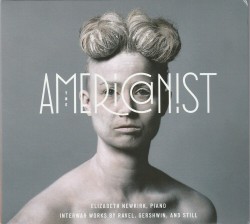 The Americanist
The Americanist
Elizabeth Newkirk
Bright Shiny Things BSTC-0166 (brightshiny.ninja)
This new release of orchestral scores reduced for solo piano by Elizabeth Newkirk stakes out grounds for how American music must maintain its connection to the vernacular. Per Newkirk’s lengthy treatise in the liner notes, the mythos of America demands inclusion and recognition of popular musical idioms in the making of “serious” music. She especially points to the styles and forms developed in the African-American culture that energizes so much of today’s music. To that end, Newkirk provides three intra-bellum works that illustrate her point, all reductions of orchestral scores made by the composers themselves, and all infused with jazz and blues.
Maurice Ravel’s reduction in some ways satisfies the way the full version can’t. In La Valse Newkirk proves herself a fine stylist, giving a more flexible version in terms of rhythm and dynamics than a conductor might ask of a full orchestra. These waltzes swoop into dips and pirouettes. (I leave it to pianists to tell me if I’m wrong about the heavy use of the sustain pedal). Gershwin’s An American in Paris is also entirely about movement. Newkirk notes that three distinct metres are assigned respectively to the American, French and British gait. (It’s so hard to believe the piece wasn’t written with Gene Kelly in mind). More than in the Ravel, I miss orchestral colours; maybe it’s just that Gershwin’s lightness needs the weight of the band, but to my mind, there’s no replacing the trumpet, the violins, the rhythm section. Their language is integral to the musical ideas.
William Grant Still’s Africa provides the substantial finale to the disc. Still’s music follows a similar aesthetic to Gershwin’s, blending Romantic tropes with blues influences. Materially, and in terms of length, it’s more substantial than the Gershwin, and more listenable, in fact. As has been noted elsewhere, there are not nearly enough recordings of his music, which makes this release so attractive.
Newkirk’s treatise is most interesting when she leaves the rarified discussion of myth and philosophy in order to discuss how these three works fit so neatly into her thesis.



